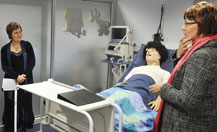 |
The new Authentic Learning Space at the School of Nursing allows students to practice very important skills in their state-of-the-art patient simulation rooms.
Photo: Supplied.
4 September 2012 |
When you visit the School of Nursing at the Bloemfontein Campus of the University of the Free State (UFS), you will be alarmed by all the casualties and patients being treated here daily.
There are patients with serious penetration wounds, as well as open and laceration wounds which could be fatal if not attended to urgently.
In one ward a child is being treated for breathing difficulties and in the emergency ward a patient who suffered a heart attack has just been rushed in.
At the end of the session students pack up their textbooks and the ‘patients’ are re-programmed and prepared for the next group of nursing students to practice their clinical skills.
The School of Nursing recently had the official opening for their Authentic Learning Space where they showcased their state-of-the-art patient simulation rooms.
In each of the many examining rooms as well as in the high-care rooms there are simulation mannequins that can be programmed for certain medical conditions or for medical emergencies.
Speaking at the opening of the Authentic Learning Space, Prof. Driekie Hay, Vice-Rector: Academic, said universities are often accused of not preparing students adequately for their careers.
“We know students learn better by interaction. With access to authentic learning spaces, students are able to gain a deeper sense of a discipline and they can begin to grasp the unwritten knowledge of practice that is often used on a daily basis.”